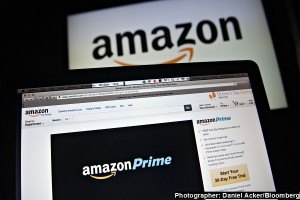Amazon.com Inc.’s proposed use of drones could drive down the cost to deliver small packages crosstown to about $1— a fraction of existing same-day delivery options, according to a study by a financial research company.
The report from New York-based ARK Invest also suggests deliveries may arrive in as soon as 30 minutes. The research tried to quantify the savings from the use of drones compared with delivery trucks and couriers. 
According to a research firm
- Amazon’s upfront drone purchase cost would be roughly $100 million.
- Amazon would have to pay $300 million annually to deploy the drones
- Amazon would need to hire thousands of drone operators
- Drone could deliver 400 million orders annually
- Customers would pay $1 for delivery of small packages
Amazon has pushed the U.S. government for permission to test unmanned aircraft as it seeks to develop drones to speed shipping products. The Federal Aviation Administration gave the Seattle-based online retailer a waiver allowing flights as fast as 100 miles (161 kilometers) an hour and as high as 400 feet off the ground, according to a letter from the agency dated Wednesday.
Amazon charges $7.99 for one-hour delivery of shampoo, paper towels and thousands of other products in some cities, including New York, Baltimore, Miami and Dallas, through its Prime Now program started in December.
“The breakthrough is the value that drones offer customers, in terms of the cost and the convenience,” said Tasha Keeney, an ARK Invest analyst who wrote the report.
Barring regulatory obstacles, Amazon would face an upfront cost of about $100 million to buy tens of thousands of drones. The company also would see expenses of about $300 million to deploy them to deliver 400 million orders annually, according to the report, which based its findings on existing technology and prices.
Amazon would need to hire thousands of operators, each capable of monitoring multiple drones simultaneously, to ensure safe takeoffs and landings, according to the study, which included the personnel cost in its calculations. Most of the drone flight would be automated, according to the study, which assumes each package weighs as much as 5 pounds and each delivery is no more than 10 miles.
Separately, Bloomberg reported Amazon’s acquisition of a data-migration startup.
According to Bloomberg, Amazon.com Inc. is said to have acquired data-migration startup Amiato last year, giving the online retailer the brains behind a technology that makes it easier to pour data into Amazon’s cloud services.
Amazon bought Amiato for the skills of its employees, according to a person familiar with the matter who wasn’t authorized to speak publicly about the deal. Terms weren’t disclosed.
The Palo Alto-based startup specialized in taking data from a variety of modern databases and migrating it into Amazon’s online archiving service named Redshift. The company had received $2 million in funding from Data Collective, Andreessen Horowitz, Ignition Partners and others.
Amazon doesn’t acquire many companies for its Amazon Web Services cloud division, instead investing heavily in internal research and development. Acquisition targets typically are small companies that fill a particular niche, such as 2lemetry, an Internet-of-Things firm Amazon purchased last month, and Israeli semiconductor startup Annapurna Labs, which the online retailer agreed to buy in January.
One use of Amiato’s technology is to take data kept in modern databases, such as MongoDB, and load it into Amazon’s Redshift. Amiato employees have subsequently gone to work in Amazon’s database and Redshift product groups, according to posts on LinkedIn.
Spokeswomen for Seattle-based Amazon didn’t respond to requests for comment on the deal.
Amazon introduced its first set of Web-services products almost 10 years ago. The business division in which Web-services sales are logged brought in $1.67 billion in sales in the company’s most recent quarter. Amazon will start breaking out its Web-services unit as its own line item later this month when it reports its next quarterly earnings.
(Amiato acquisition story reported by Jack Clark.)





















 Berkshire-owned Utility Urges Oregon Appeals Court to Limit Wildfire Damages
Berkshire-owned Utility Urges Oregon Appeals Court to Limit Wildfire Damages  Nearly 26.2M Workers Are Expected to Miss Work on Super Bowl Monday
Nearly 26.2M Workers Are Expected to Miss Work on Super Bowl Monday  20,000 AI Users at Travelers Prep for Innovation 2.0; Claims Call Centers Cut
20,000 AI Users at Travelers Prep for Innovation 2.0; Claims Call Centers Cut  Lessons From 25 Years Leading Accident & Health at Crum & Forster
Lessons From 25 Years Leading Accident & Health at Crum & Forster 







